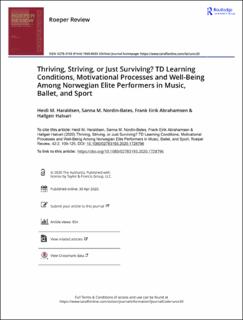Thriving, Striving, or Just Surviving? TD Learning Conditions, Motivational Processes and Well-Being Among Norwegian Elite Performers in Music, Ballet, and Sport
Peer reviewed, Journal article
Published version
Permanent lenke
https://hdl.handle.net/11250/2736753Utgivelsesdato
2020Metadata
Vis full innførselSamlinger
Sammendrag
This study explored the motivational experiences of nine successful elite performers in ballet, music, and swimming at Norwegian talent development (TD) schools. Semistructured interviews were conducted. Thematic analysis revealed that the performers navigated within and between several contextual layers, characterized by egalitarian values, high-performance deliberate practice, and controlling conditions. These TD learning conditions provided multifaceted motivational experiences that affected performers’ motivational regulation, ranging from predominantly self-determined, via multifaceted, to predominantly controlled. The types of motivational regulation mattered, as performers regulated by self-determined motivation engaged in their performance development in a more joyful, robust, and healthy way (i.e., self-realization, flow, self-esteem, and vitality), showing less dependence on their given TD learning conditions. In contrast, performers regulated by controlled motivation reported higher vulnerability, and in turn, more ill-being (i.e., low self-esteem, perfectionism, obsessiveness, anxiety, negative affect, and exhaustion).
